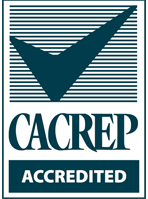CACREP Accreditation
Austin Peay State University's (APSU) Counseling Graduate Program is committed to
excellence and, as of July 2019, the Council for Accreditation of Counseling and Related Educational Programs (CACREP), a specialized accrediting body recognized by the Council for Higher Education
Accreditation (CHEA), has granted accreditation to the following programs in the Department
of Psychological Science and Counseling: M.S. in Counseling, Clinical Mental Health
Counseling concentration; and M.S. in Counseling, School Counseling concentration. CACREP accreditation recognizes that the content and quality of APSU's Counseling
Graduate Program have been evaluated and meet the high standards set by the profession.
All students who graduate within 18 months of the program receiving accreditation
(January 2018 and later) will be grandfathered and considered to have graduated from
a CACREP-accredited program.
Mission
The mission of the Master’s Program in Counseling is to provide both academic and clinical training that will prepare students to be highly effective professional counselors. Our goal is to influence students to be life-long learners who are sensitive to and appreciative of the developmental needs of individuals and groups in the context of a rapidly changing multicultural society. Students completing the school counseling concentration are eligible for Tennessee certification as school counselors pending their passing of the Praxis Exam. Students completing the mental health counseling concentration will have met the educational requirements for licensure in Tennessee as Licensed Professional Counselors with the Mental Health Service Provider designation.
Counseling Program Student Outcomes
(Fall 2023 - Summer 2024)
| Clinical Mental Health Concentration | School Counseling Concentration |
|---|---|
|
Number of Graduates: 9 |
Number of Graduates: 4 |
|
Completion Rate: 90% (out of 20 who started in 2022, 11 continuing enrollments, 2 withdrawals, 7 graduated) |
Completion Rate: 100% (out of 4 who started in 2021, 1 continuing enrollment, 3 graduated) |
|
Comprehensive Exam (CECE) Pass Rate: 87% (7/8) Licensure Exam (NCE) Pass Rate prior to graduation: 100% (3/3) |
Comprehensive Exam (CECE) Pass Rate: 75% (3/4) Licensure Exam (PRAXIS II) Pass Rate: 75% (3/4) |
|
Job Placement/Doctoral Acceptance Rate: 100% at the time of graduation for students seeking employment. |
Job Placement/Doctoral Acceptance Rate: 100% at the time of graduation for students seeking employment |
Student Assessment, Program Evaluation, & Annual Report
To ensure we are working effectively toward this mission, the Graduate Counseling Program at Austin Peay State University (APSU) engages in systematic and ongoing evaluation of its two counseling program concentrations. You can find out more about our ongoing assessment and evaluation procedures here. We also invite you to view our Annual Report, which reports the results of our program evaluation here or by visiting the Student Assessment, Program Evaluation, and Annual Report page.
Values Statement
The Austin Peay State University Counseling program emphasizes the importance of professionalism, ethical practice, and respect for others. The program faculty are committed to educating students who strive to promote fairness and well-being in society. This commitment aligns with the ethical standards of the counseling profession as outlined in the American Counseling Association's Code of Ethics (2014), the American School Counselor Association's Ethical Standards (2022), and the CACREP Standards (2024). Students enrolled in the Counseling program are expected to uphold these principles in their academic and professional conduct.
Program Objectives
The Masters' Program in Counseling strives to support the holistic development of quality counselors by meeting program and curriculum-specific objectives aligned with CACREP Standards.
|
CACREP Professional Identity Standard
|
APSU Program Objectives
|
|
|
Professional Counseling Orientation and Ethical Practice
|
To prepare counselors who are knowledgeable about the philosophy, history, and current
and future trends in the counseling profession.
|
|
|
Social and Cultural Diversity
|
To train counselors who can recognize, understand, and respond to social and cultural
differences and change in our society.
|
|
|
Human Growth and Development
|
To train counselors who have a foundation for understanding human behavior and development. To prepare counselors who are able to design, implement, and evaluate developmentally appropriate counseling interventions and programs. |
|
|
Career Development
|
To prepare counselors who are knowledgeable and skilled in helping clients make life
and career decisions.
|
|
|
Counseling and Helping Relationships
|
To train counselors who are knowledgeable and skilled in the helping/counseling process. To prepare counselors who are able to apply knowledge, theory, and skills to work effectively with clients in a variety of modalities (individual, group, family) and to use crisis intervention, brief counseling, and long-term approaches. |
|
|
Group Counseling and Group Work
|
To train counselors who are knowledgeable and skilled in providing group counseling.
|
|
|
Assessment and Testing
|
To prepare counselors who are knowledgeable and skilled in gathering, analyzing, interpreting, and presenting data about individuals. To prepare counselors who are knowledgeable and skilled in the use of assessment techniques, including diagnosis, with individuals and groups. |
|
|
Research and Program Evaluation
|
To prepare counselors who are knowledgeable about research and program evaluation. To prepare counselors who are able to read, critique, utilize and contribute to professional research literature and who are able to engage in program evaluation. |
|
| CACREP Professional Identity Standard | APSU Program Objective | |
|
Professional Practice Standards |
Develop, through supervised practicum and internship experiences, an integration of
the knowledge and skills needed to be successful as practicing counselors.
|
|
|
Personal Growth and Understanding |
Develop, through self-reflection and insight, an understanding of oneself and the
use of self in the counseling process. Develop a personal approach to counseling and
client/student advocacy with a clear understanding of counselor functions.
|
|








